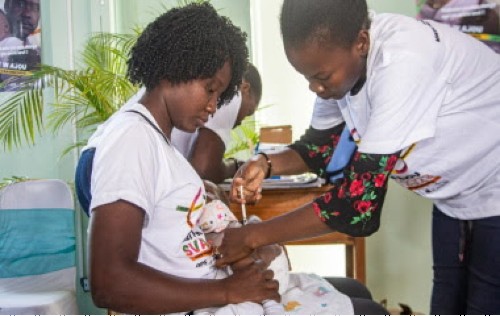GENEVA – The World Health organization (WHO) has recommended a new anti-malaria vaccine for children, a move that could offer countries a cheaper and more readily available option than the world’s first shot against the parasitic disease.
 A child being vaccinated against malaria in Haiti (File Photo)The WHO said the R21/Matrix-M vaccine, developed by Britain’s Oxford University, can be used to curb the life-threatening illness spread to humans by mosquitoes.
A child being vaccinated against malaria in Haiti (File Photo)The WHO said the R21/Matrix-M vaccine, developed by Britain’s Oxford University, can be used to curb the life-threatening illness spread to humans by mosquitoes.
It said that “both vaccines are shown to be safe and effective in preventing malaria in children and, when implemented broadly, are expected to have high public health impact.”
It is the second malaria vaccine recommended by WHO, following the RTS,S/AS01 vaccine, which received a WHO recommendation in 2021.
“As a malaria researcher, I used to dream of the day we would have a safe and effective vaccine against malaria. Now we have two,” said Dr Tedros Adhanom Ghebreyesus, WHO Director-General.
Demand for malaria vaccines is unprecedented; however, RTS,S is in short supply. The addition of R21 to the list of approved shots is expected to result in sufficient supply to benefit all children living in areas where malaria is a public health risk.
Tedros described it as “a vital additional tool to protect more children faster, and to bring us closer to our vision of a malaria-free future.”
WHO is now reviewing the vaccine for prequalification. Having got approval that will enable GAVI [a global vaccine alliance] and Children’s Fund (UNICEF) to buy the vaccine from manufacturers, added Tedros.
The vaccine will be rolled out in early 2024, and doses would cost between two and four US dollars.
WHO also recommended Takeda Pharmaceuticals’ vaccine against dengue for children aged six to 16 living in areas where the infection is a significant public health problem.
Dengue, common in tropical and subtropical climates, is a viral infection spread from mosquitoes to people.
WHO’s advisory group SAGE also recommended that all countries in the African “meningitis belt” introduce what it described as (Men5CV) into their routine immunization programs. It said a single dose scheduled at nine to 18 months of age should fight the disease.


